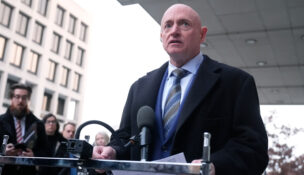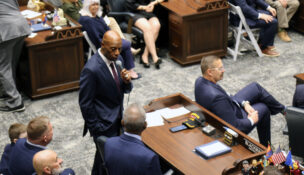Arizona’s ‘dark money’ law faces challenge from Republican lawmakers
Howard Fischer, Capitol Media Services//September 29, 2025//
Arizona’s ‘dark money’ law faces challenge from Republican lawmakers
Howard Fischer, Capitol Media Services//September 29, 2025//
Key Points:
-
Arizona Supreme Court allows challenge to voter-approved “dark money” measure
-
Voters approved Proposition 211 in 2022 to increase transparency in campaign financing
-
The measure requires organizations to trace donations back to original source
Republican legislative leaders are entitled to challenge a voter-approved measure designed to shine a light on “dark money” in Arizona politics, the state Supreme Court ruled.
In a divided ruling, five justices acknowledged that it was voters in 2022 who approved Proposition 211, exercising their constitutional power to create their own laws when the Legislature does not act. And the justices said another voter-approved constitutional measure bars lawmakers from repealing what has been approved at the ballot.
But Justice Clint Bolick, writing for the majority, said none of that means voters were entitled to give the Citizens Clean Elections Commission, which administers Prop. 211, blanket authority to enact rules to make the system work and, more to the point, make the rules off-limits to legislative tinkering.
Instead, the justices sent the case back to a trial judge, who had tossed out the original legislative lawsuit, to determine whether the provisions in Prop. 211 that delegates power to the commission are unconstitutional. And even if they are, Bolick said, that doesn’t necessarily mean the entire ballot measure fails.
The ruling is the first setback for initiative backers who, until now, have prevailed against three separate legal challenges to the law.
It may not be the last: The Supreme Court is considering a separate challenge by two private groups that Prop. 211 violates the right to privacy of both its users and their donors.
House Speaker Steve Montenegro, who is challenging Prop. 211 along with Senate President Warren Petersen, called the Sept. 29 ruling “a victory for the voice of the people and the principle of separation of powers.”
“Policy decisions should not be made by an unelected commission,” he said. “That responsibility belongs to the Legislature.”
But Terry Goddard, the former state attorney general who spearheaded the initiative, called the ruling “very disturbing.” And Kris Mayes, the current attorney general who interceded in the case to defend the initiative, called the challenge to the law by the GOP leaders “outrageous.”
“Voters made it clear they want transparency in elections,” she said. “GOP legislative leaders apparently don’t care what Arizona voters decide unless they agree with it.”
Approved by voters by a nearly 3-1 margin, the initiative says that any organization that spends more than $50,000 on a statewide race — half that for other contests — has to publicly disclose anyone who has given at least $5,000.
More to the point, the measure requires those recipient groups to trace the money back to its original source.
That is a crucial distinction.
Candidates have always had to disclose the names of all donors to their campaigns. The same is true of organizations that have mounted campaigns to support or defeat a ballot measure.
But what was missing from all that were the names of people who gave to groups that mounted their own independent campaigns to elect or defeat candidates or ballot measures.
Voters got a dose of that in 2014.
That year, several groups put $10.7 million into successful efforts to elect Republicans Tom Forese and Doug Little to the Arizona Corporation Commission, the panel that determines how much utilities can charge their customers.
Three years later, the commission approved a 4.5% rate hike for Arizona Public Service.
However, it wasn’t until 2019 that Pinnacle West Capital Corp., APS’ parent company, admitted it had given $5.9 million to the Free Enterprise Club and another $3.5 million to an organization called Save Our Future Now, money the company conceded had gone into influencing the commission rate.
PinWest also disclosed giving nearly $1.4 million to the Arizona Cattle Feeders Association, also money that a company spokeswoman said was spent on that same race.
That, however, was not the end of the company’s hidden 2014 campaign spending.
It was later discovered that Pinnacle West also contributed $50,000 to the Republican Governors Association, which helped elect Doug Ducey as governor in the first election. Additionally, there was $425,000 to the Republican Attorneys General Association, which, in turn, purchased commercials to help elect Mark Brnovich.
All that was cited in the successful campaign to approve Prop. 211.
GOP legislative leaders initially sought to overrule entirely what voters had approved, arguing that it infringed on the rights of the Republican-controlled Legislature to set campaign finance laws.
That faltered when Maricopa County Superior Court Judge Timothy Ryan said voters have an absolute right to enact laws requiring full disclosure of the true source of political donations, even if GOP lawmakers don’t like it.
“The citizens of Arizona voted to receive more information about the sources of money trying to influence Arizona elections,” he wrote. “The public interest weighs heavily in favor of protecting Arizona voters’ constitutionally protected legislative authority, and their interests in being fully informed when choosing their representatives and voting on initiatives and referenda, as expressed in Prop. 211.”
That was upheld by the Court of Appeals.
In Monday’s ruling, Bolick agreed that the Arizona Constitution gives voters the same rights to make laws as the Legislature itself.
However, he and the other four justices in the majority stated that this doesn’t automatically grant voters the right to delegate to the Clean Elections Commission the power to implement the law and establish rules for its enforcement — especially when it bypasses the Legislature.
“The measure purports to give the commission carte blanche authority to perform any act in furtherance of the measure, without limitation or prohibition by the Legislature, and to establish hegemony for agency rules over contrary statutes,” Bolick wrote.
Chief Justice Ann Scott Timmer, in her dissent, said her colleagues were rushing in to deal with a problem that does not exist — and may never exist.
She pointed out the GOP lawmakers have not claimed that any specific actions taken by the commission or rules enacted have usurped their legislative authority.
“If it does, affected parties, which may include the Legislature, can then challenge the commission’s action,” Timmer wrote for herself and retired Justice Rebecca Berch, who sat in on the case.
Bolick sniffed at the suggestion that any legal challenge needs to wait until the commission has done something that intrudes on legislative power.
“That is akin to arguing that if your credit card is stolen, you can file suit only when the thief uses it,” he wrote.













































